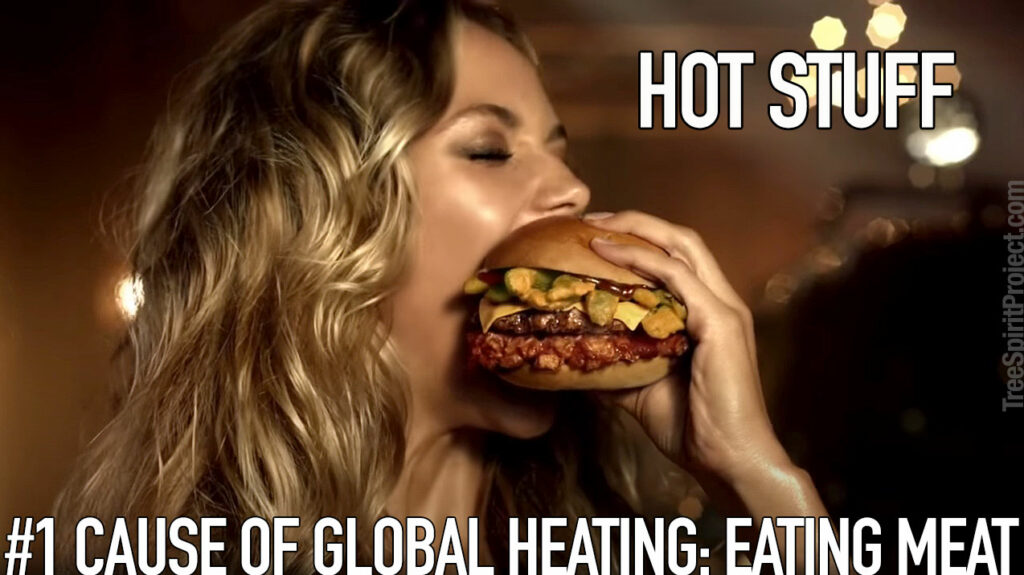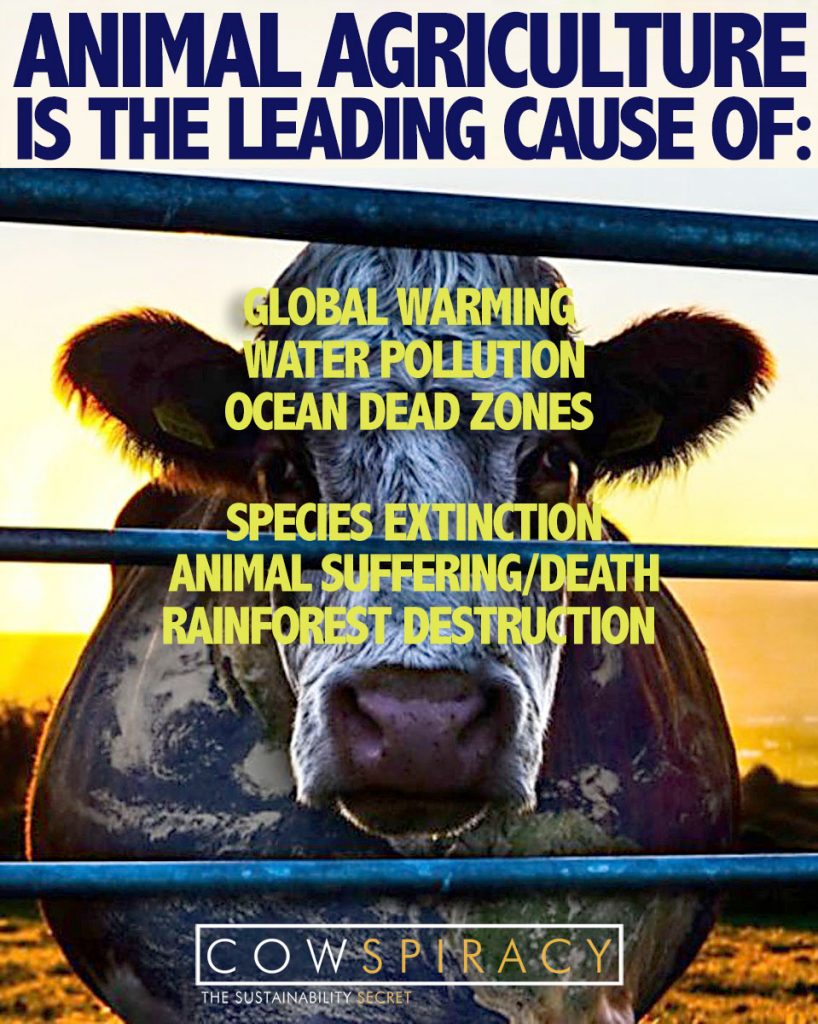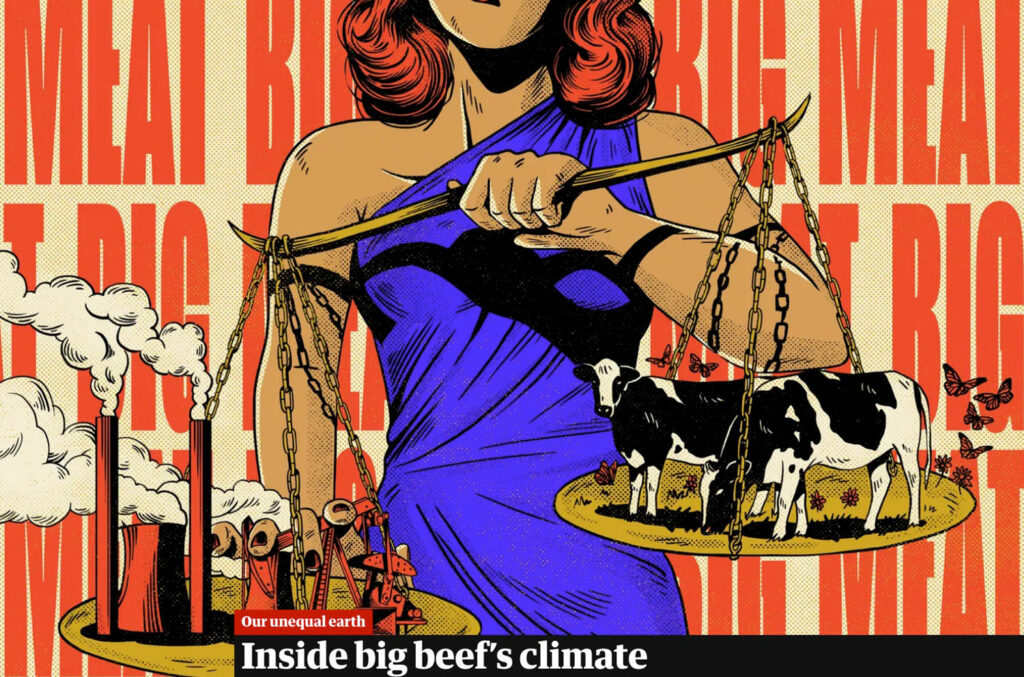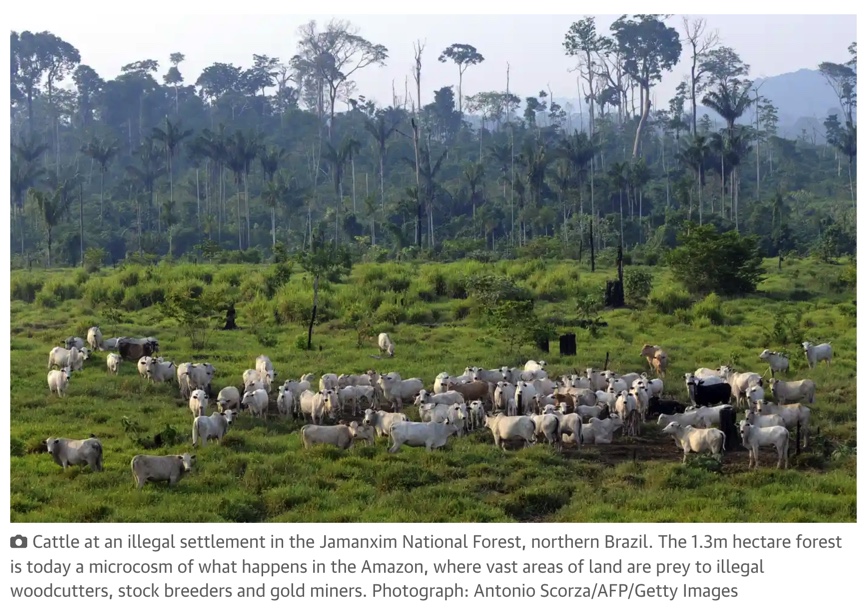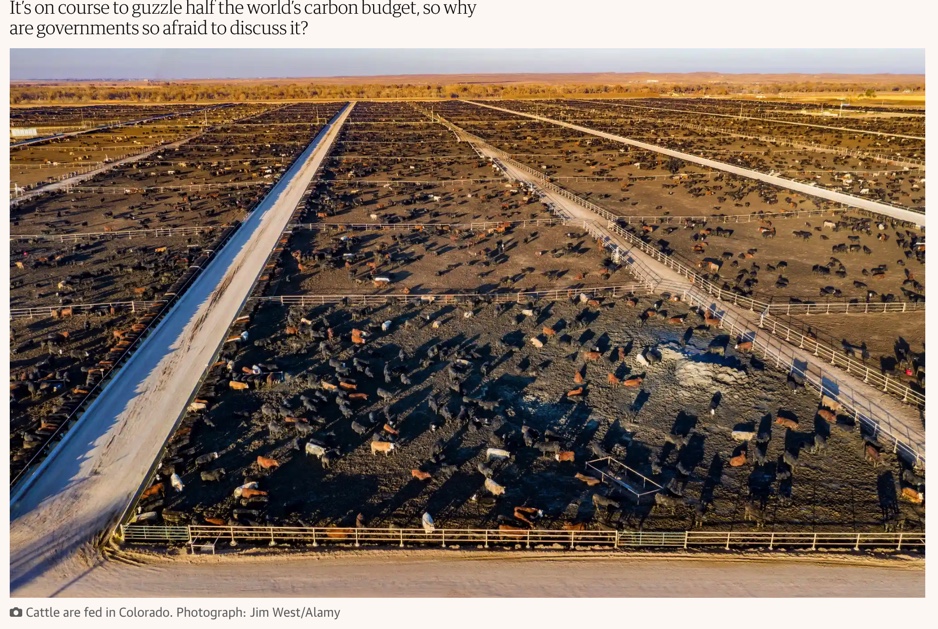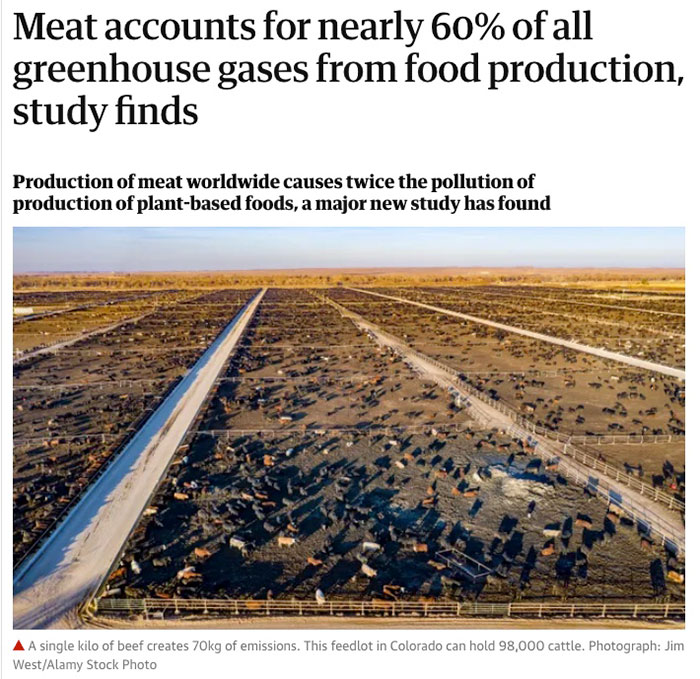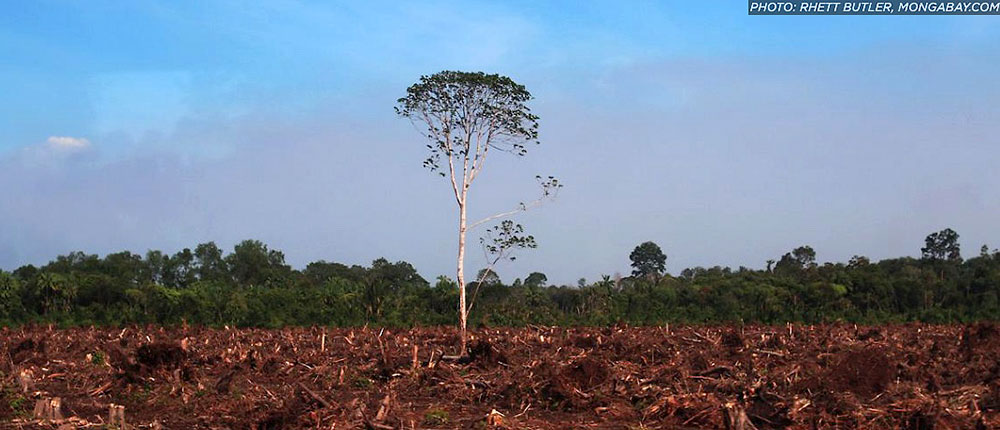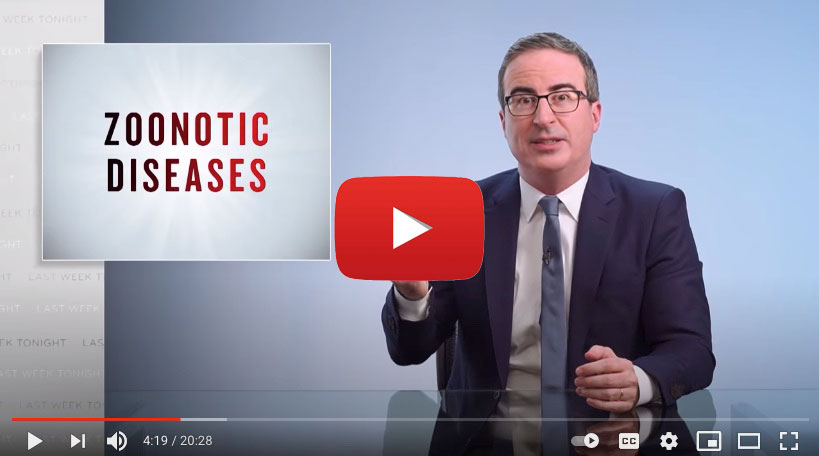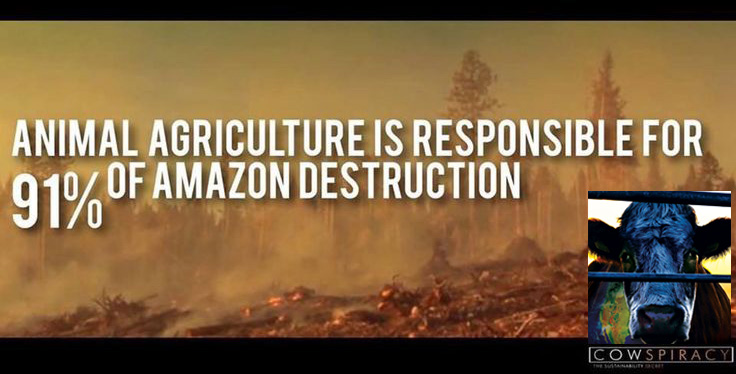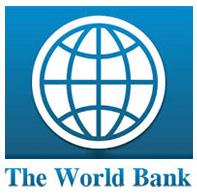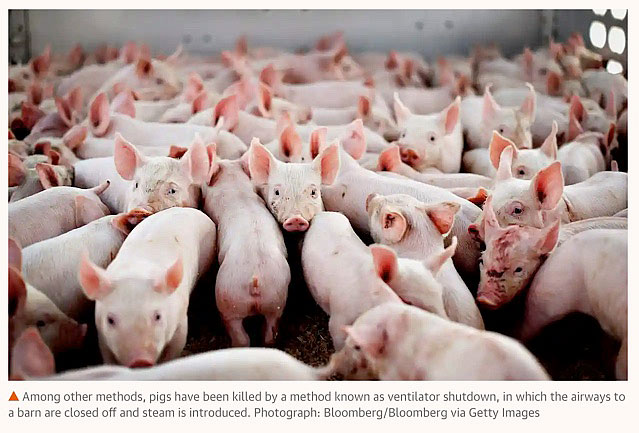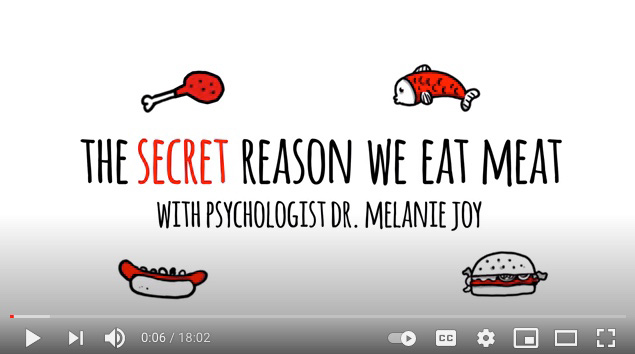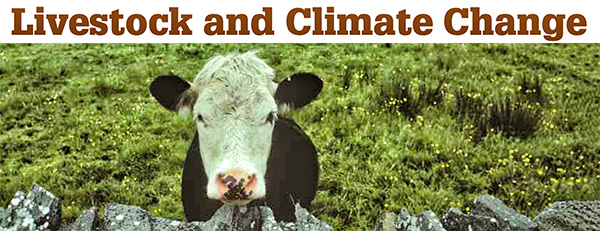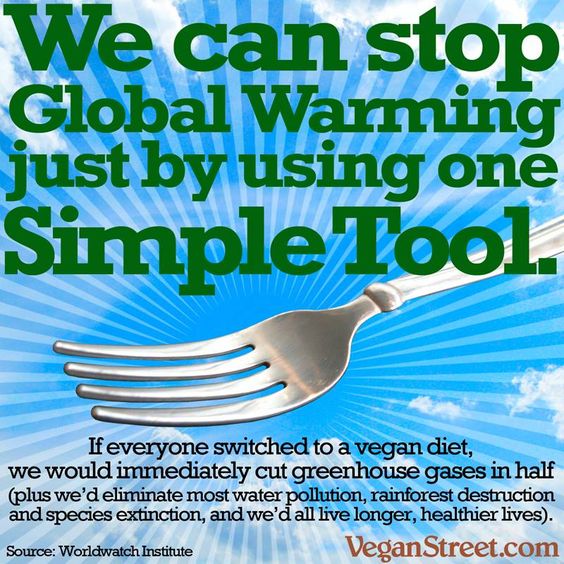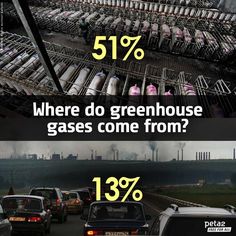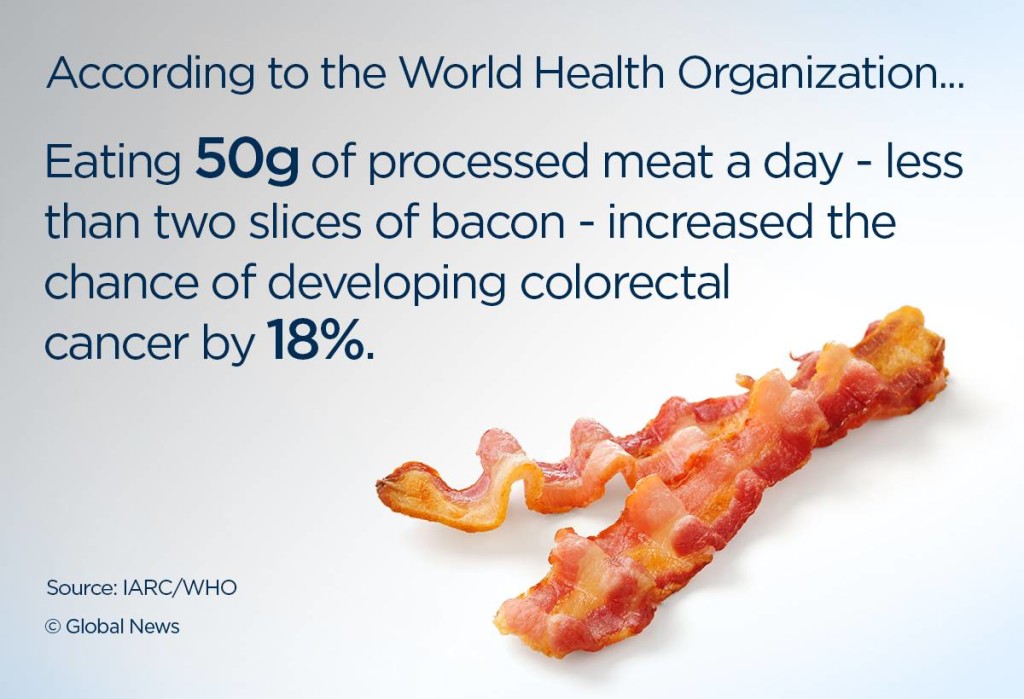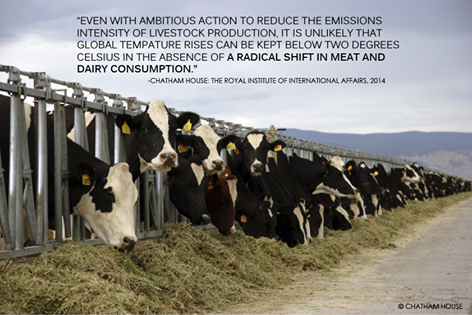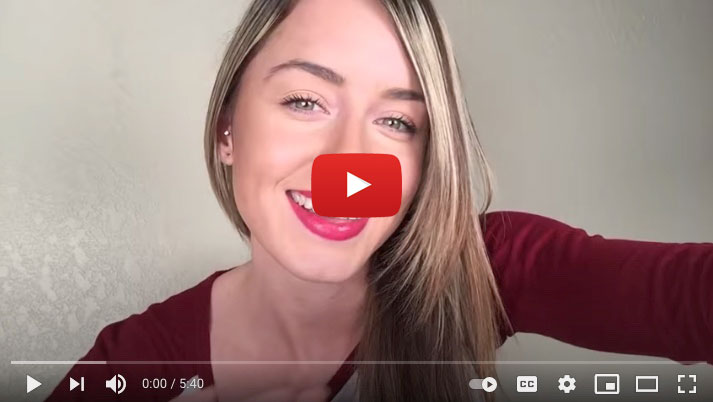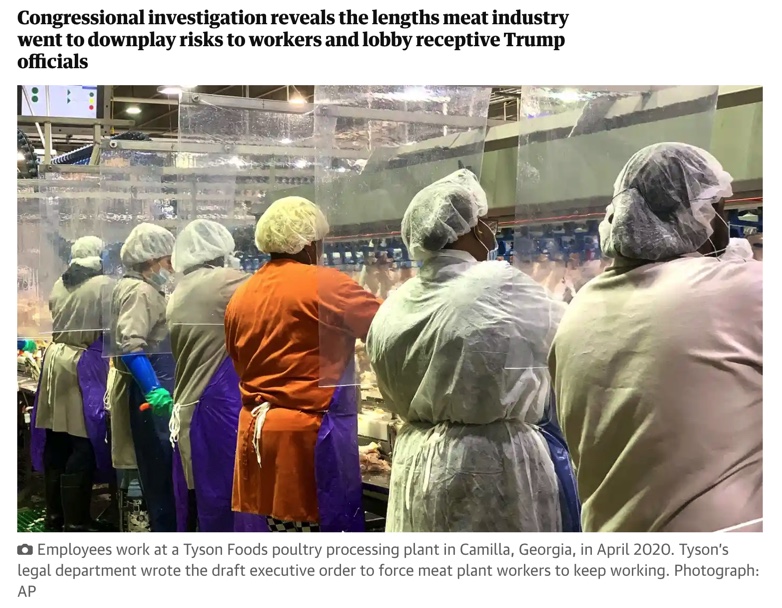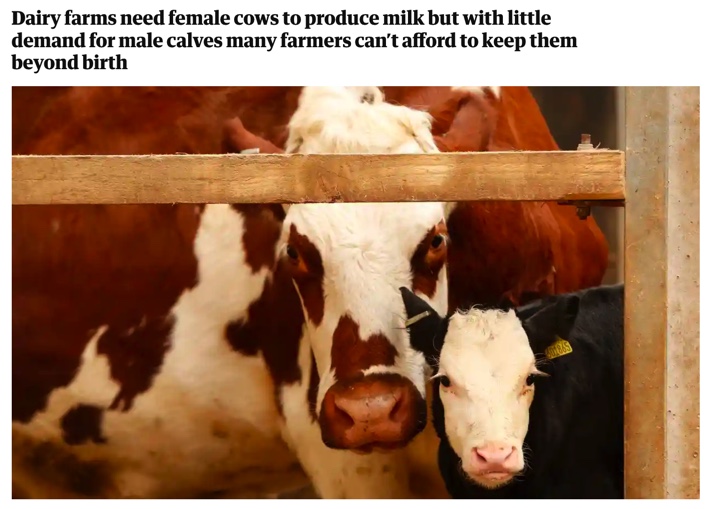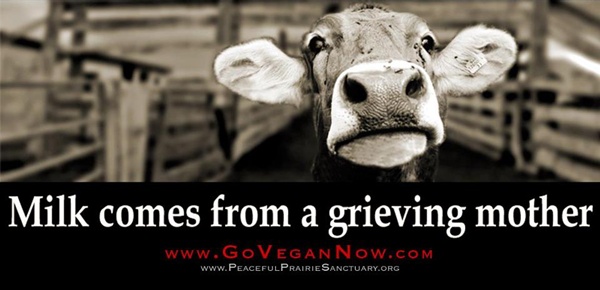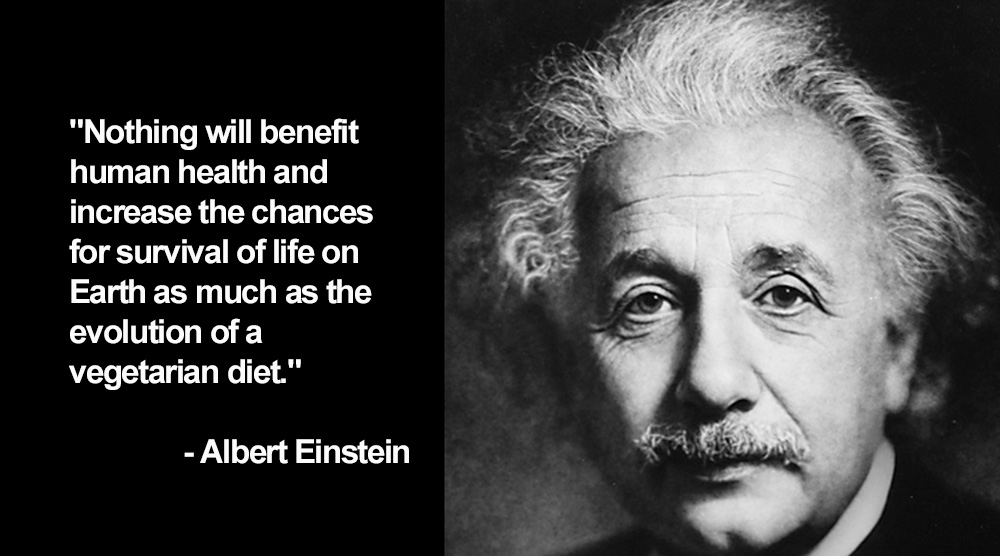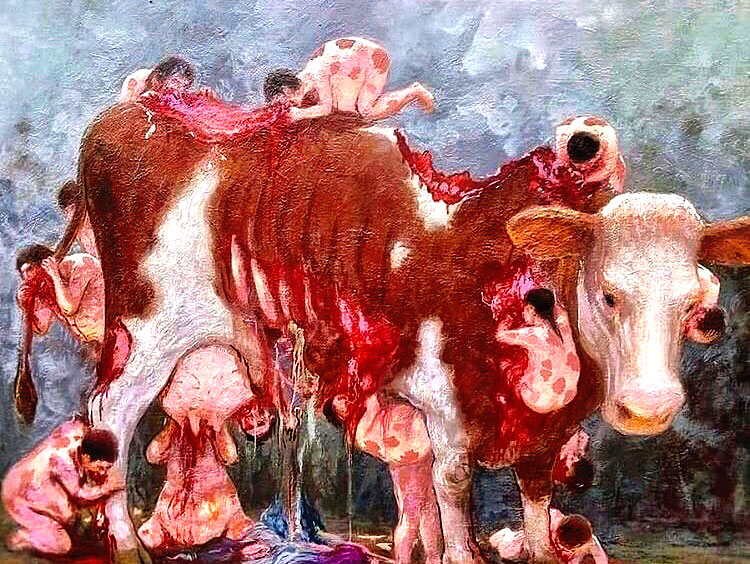The single most immediate, effective action you can take, today, to mitigate the climate crisis: eat less meat & dairy.
Avoiding meat and dairy products is the simplest, more direct, and most effective way to reduce your environmental impact on the planet’s atmosphere, oceans, forests and waterways, according to scientists behind the most comprehensive analysis to date of the damage animal factories (cows, pigs, chickens raised for human consumption) do Earth’s ecosystems. And humanity’s life support systems.
VIDEO: Scathing summary of the compelling arguments for ditching meat & dairy.
Watch just a few minutes of this video interview with journalist George Monbiot.
Jump to the 12 min. mark to get to the meat of it.
Inside big beef’s climate messaging machine: confuse, defend and downplay
[The beef industry] …does not want you to read scientific papers showing wealthy nations must reduce meat consumption to keep below the average global temperature rise of 2ºC, a threshold to stop systems collapse, mass extinctions, fatal heat waves, drought and famine, water shortages and flooded cities. – Illustration by Lola Beltran, The Guardian
EXCERPTS: “…the truth is that we already eat too much beef for the planet’s good. The world can’t afford the rise in global beef consumption that experts predict – while wealthier nations, whose residents have the most emissions-intensive diets, could make rapid climate gains by choosing to eat less.
 This narrative is one that industry-aligned interests badly want to extinguish. Through blog posts, videos, educational assets, op-eds, TV ads, social media campaigns, trained influencers and other channels – many described here for the first time – the industry is trying to convince us all of what the science definitely doesn’t show: that dietary change has no role in climate strategy.
This narrative is one that industry-aligned interests badly want to extinguish. Through blog posts, videos, educational assets, op-eds, TV ads, social media campaigns, trained influencers and other channels – many described here for the first time – the industry is trying to convince us all of what the science definitely doesn’t show: that dietary change has no role in climate strategy.
READ Guardian ARTICLE by Joe Fasler, May 3, 2023: https://www.theguardian.com/environment/2023/may/03/beef-industry-public-relations-messaging-machine
Avoiding meat and dairy is ‘single biggest way’ to reduce your impact on Earth
Livestock provides just 18% of calories on 83% of farmland
“A vegan [plant-based] diet is the single biggest way to reduce your impact on planet Earth; not just greenhouse gases, but global acidification, eutrophication, land use and water use,” said Joseph Poore, at the University of Oxford, UK, who led the research.
“It is far bigger than cutting down on your flights or buying an electric car,” Poore said, as these only cut greenhouse gas emissions.
 The new research, published in the journal Science, shows that without meat and dairy consumption, global farmland use could be reduced by more than 75% – an area equivalent to the US, China, European Union and Australia combined – and still feed the world. Loss of wild areas to [animal] agriculture {and crops grown to feed animals] is the leading cause of the current mass extinction of wildlife.
The new research, published in the journal Science, shows that without meat and dairy consumption, global farmland use could be reduced by more than 75% – an area equivalent to the US, China, European Union and Australia combined – and still feed the world. Loss of wild areas to [animal] agriculture {and crops grown to feed animals] is the leading cause of the current mass extinction of wildlife.
READ Guardian ARTICLE by Damian Carrington, 5.31.18: https://www.theguardian.com/environment/2018/may/31/avoiding-meat-and-dairy-is-single-biggest-way-to-reduce-your-impact-on-earth
The biggest single action you can take, every day, to reduce your climate impact:
One big subject our leaders at Cop27 won’t touch: livestock farming
Renewable energies – specifically solar and wind — are already our best options economically, not just ecologically. And of course economics are tied to the environment. How many hundreds of billions (trillions?) of dollars will more heat waves, droughts, wildfire, hurricanes, food shortages, and other disasters on our horizon, cost humanity?
 Livestock farming is on course to guzzle half the world’s carbon budget, so why won’t governments discuss it?
Livestock farming is on course to guzzle half the world’s carbon budget, so why won’t governments discuss it?
by George Monbiot, November 9, 2021
EXCERPT:
An analysis by Our World in Data shows that even if greenhouse gas pollution from every other sector were eliminated today, by 2100 food production will, on its current trajectory, bust the global carbon budget two or three times over. This is largely because of animal farming, which accounts for 57% of greenhouse gases from the food system, though it provides just 18% of the calories.
This issue has become even more urgent now we know the heating impact of methane is rising. Livestock farming is the world’s greatest source of methane released by human activities. Yet there is no mention of it in the global methane pledge launched at last year’s climate summit.
Governments have not ignored these issues by accident; they have resolutely looked away. A new analysis for Chatham House finds that only 12 nations name emissions from farm animals in their official climate commitments, and none seeks to reduce livestock production. Only two nations (Costa Rica and Ethiopia) mention dietary change: arguably the most important of all environmental actions, as animal farming is also the world’s greatest cause of habitat destruction and wildlife loss.
The raising and culling of animals for food is far worse for the climate than growing and processing fruits and vegetables for people to eat, the research found, confirming previous findings on the outsized impact that meat production, particularly beef, has on the environment.
Driving Deforestation: beef has the largest impact of 4 major drivers.
EXCERPT:
Converting forest to pasture for beef cattle, largely in Latin America, is responsible for destroying 2.71 million hectares — 6.69 million acres — of tropical forest each year—an area [the size of] Massachusetts—in just 4 countries.
VIDEO: How to simultaneously mitigate pandemics, global warming, and deforestation.
With one simple societal shift, we can end zoonotic (animal-generated) viruses, and slow our own heating of our planet.
WATCH 60 Minutes story on the Nipah virus for both an eerie foretelling of today’s similar Covid-19 virus, and how deforestation and our common practices of confining and eating animals lead to zoonoses, diseases transmitted from animals to humans:
VIDEO: How to reduce pandemics risk AND global warming. (Stop eating animals, humans.)
John Oliver has the guts, smarts (and potty mouth) to focus on the cause, not just the effects, of Covid-19 and most pandemics: destroying wild habitats and cramming animals into factories for slaughter and human consumption. https://www.youtube.com/watch?v=_v-U3K1sw9U&feature=youtu.be
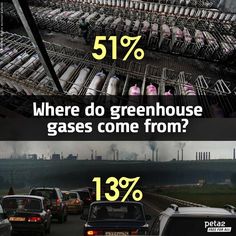 1. ANIMAL FACTORIES EMIT MORE GREENHOUSE GASES (51%) TO THE ATMOSPHERE THAN ALL THE WORLD’S CARS, BUSES, TRUCKS, PLANES, TRAINS, AND SHIPS COMBINED (13% of GHGs).
1. ANIMAL FACTORIES EMIT MORE GREENHOUSE GASES (51%) TO THE ATMOSPHERE THAN ALL THE WORLD’S CARS, BUSES, TRUCKS, PLANES, TRAINS, AND SHIPS COMBINED (13% of GHGs).
Feeding plant crops to billions of animals every year for human consumption involved multiple industries which, collectively, contribute a staggering 51% of global GHGs (greenhouse gases). By comparison, all the world’s cars, trucks, buses, planes and trains COMBINED, aka “the transportation sector,” emit about 13% of global GHGs. Source: The Worldwatch Institute, CLICK TO READ REPORT
Can you handle the truth? READ MORE FACTS: http://www.cowspiracy.com/facts
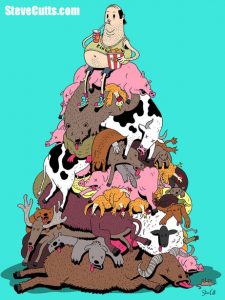 2. HUMANS EATING ANIMALS — especially cattle — IS THE #1 CAUSE OF:
2. HUMANS EATING ANIMALS — especially cattle — IS THE #1 CAUSE OF:
• GLOBAL DEFORESTATION
1) cutting down forests at an astonishing rate of over 1 acre/sec;
2) killing ocean life with massive run-off from animal factories;
3) heating up the planet at an unprecedented rate in human history.
READ more about human-caused climate change.
3. ANIMAL FACTORY POLLUTION is finally getting the crucial attention it deserves, including massive water and ocean pollution, land degradation, and atmosphere-damaging GHGs. Methane (CH4) from cattle (enteric and fecal) is over 20x more destructive than CO2 due to its heat-trapping properties.
All animal “agriculture” — agriculture being the euphemism for breeding, feeding, killing, and transporting animals — creates a staggering 51% of all GHGs (greenhouse gases) from feeding, killing, and transporting literally billions of cows, pigs and chickens for people to eat, every year. For the vast majority of people, “meat” — the popular euphemism for animal flesh — is a luxury item, not a necessary food source.
BRILLIANT. SCATHING. INSIGHTFUL.
Comic gadfly Bill Maher sums up much of the information on this page, boiled down to his usual, blistering, funny and profane “New Rule” segment. On the connections between the pandemic and our atrocious, worldwide treatment of animals — including eating them here in the U.S. April 24, 2020
CORONAVIRUS PANDEMIC HIGHLIGHTS GRUESOME ANIMAL ABUSE AT U.S. FACTORY FARMS.
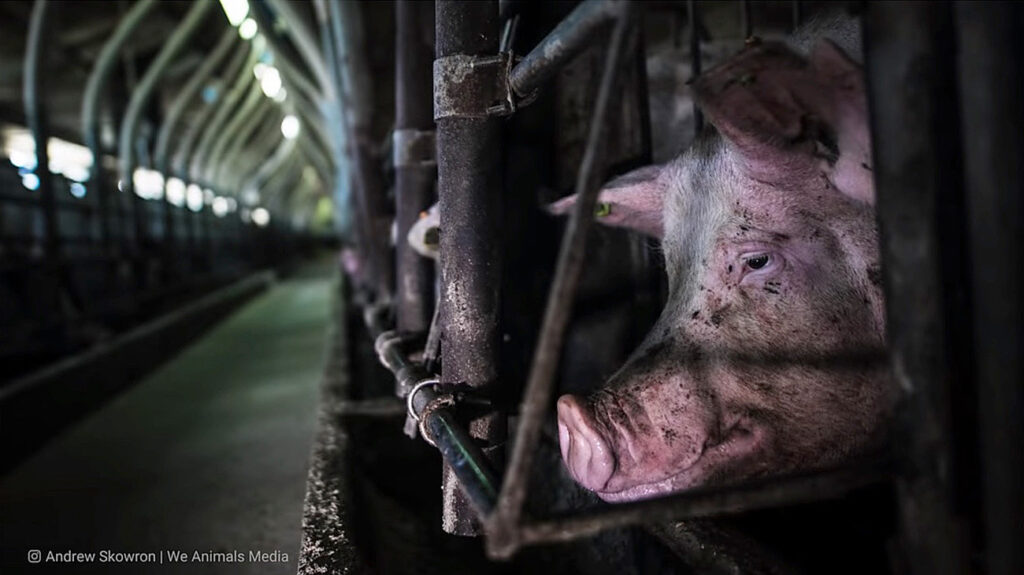
The pandemic has focused our attention on how American agribusiness – which has benefited from Trump Administration deregulation – abuses animals on an industrial scale.
READ Guardian ARTICLE: https://www.theguardian.com/commentisfree/2020/aug/03/coronavirus-animal-abuse-us-factory-farms?CMP=Share_iOSApp_Other
VIDEO: “The Secret Reason We Eat Meat”
Dr. Melanie Joy, social psychologist and author explores “carnism,” the dominant belief system almost all of us were raised with — and are completely unaware of.
51% of global greenhouse gases (GHGs) come from humans eating animals. Read why.
READ a thorough examination of how animal factories (often called “agriculture”), especially the world’s cattle, produces 51% of global GHGs (greenhouse gases). Read how this estimate of livestock air pollution is more accurate, detailed in Livestock and Climate Change (LCC) report by The Worldwatch Institute, a respected, non-partisan Wash. D.C.-based think tank.
The report explains why the United Nation’s (FAO) 13% estimate for animal factories global GHGs is grossly underestimated, including by: 1) not counting cow’s methane respiration; 2) inaccurately claiming there are only 21.7 billion animals worldwide, instead of the actual 50-70 billion; 3) assessment not by environmental experts while the World Bank researchers (Robert Goodland and Jeff Anhang) for Worldwatch’s report are:
http://www.worldwatch.org/files/pdf/Livestock%20and%20Climate%20Change.pdf
READ MORE about the greater accuracy of the Animal Ag = 51% of global GHGs (greenhouse gases) figure, over the 18% United Nations FAO (Food & Agriculture Organization) estimate.
Note that both studies rank “Animal Ag” emissions as greater than all the world’s planes, trains, automobiles, buses, trucks and ships COMBINED.
 • READ: “The World’s Leading Driver of Climate Change: Animal Agriculture” – January 18, 2015 http://www.new-harvest.org
• READ: “The World’s Leading Driver of Climate Change: Animal Agriculture” – January 18, 2015 http://www.new-harvest.org
 Study shows meat creates 50% of greenhouse gases
Study shows meat creates 50% of greenhouse gases
• READ: “Study claims meat creates half of all greenhouse gases” – Livestock causes far more climate damage than first thought…” [in United Nations FAO report – Ed.] – Nov. 2009
• READ United Nations’ Food & Agriculture Organization (FAO) article:
“Tackling Climate Change through Livestock [reduction]”
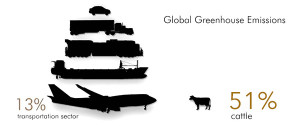 3. ANIMAL AGRICULTURE EMITS MORE GREENHOUSE GASES THAN ALL CARS, BUSES, TRUCKS, PLANES, TRAINS, AND SHIPS COMBINED. Industrial animal agriculture — the raising of literally billions of animals every year for people to eat — is an environmentally devastating business, polluting land, air, rivers and oceans.
3. ANIMAL AGRICULTURE EMITS MORE GREENHOUSE GASES THAN ALL CARS, BUSES, TRUCKS, PLANES, TRAINS, AND SHIPS COMBINED. Industrial animal agriculture — the raising of literally billions of animals every year for people to eat — is an environmentally devastating business, polluting land, air, rivers and oceans.
THE FACTS ABOVE ARE HARD TO SWALLOW — BUT THEY’RE TRUE. Partly this is because animal production creates so much methane (CH4) and nitrous oxide (N2O), greenhouse gases that are, respectively, 30x and 300x more destructive to the atmosphere than carbon (CO2) emissions from all the planes, trains, automobiles, trucks, buses, and ships in the world (aka, “the transportation sector”).
Feeding huge amounts of grain to cattle and pigs rather than directly to people is INCREDIBLY inefficient and wasteful of plant food, water and land, which is deforested to raise cattle and all the corn and soy they eat.
VIDEO: Burger King (and its supplier, agricultural giant Cargill) destroys dwindling South American rainforest to grow corn, to feed cows and chickens, to make your yummy burgers. You can make a reduce deforestation, and global warming, by not eating/supporting corporate animal slaughter, and consumption. Video by Plant Based News.
LOVE YOUR Mother, Earth? WATCH “VEGAN 2020” documentary on the huge global shift toward a plant-based diet. YOU can mitigate global warming every day, protect forests and oceans from destruction and degradation, and reduce massive, systemic animal abuse. All while improving your health, and without waiting for any corporation to clean up its act.
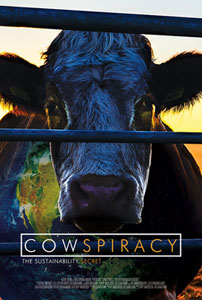 If you consider yourself an environmentalist or a nature, tree, or animal lover, you owe it to yourself to see a 2014 documentary film, “Cowspiracy: The Sustainability Secret” which focuses on the environmental effects of eating meat. It’s not one of those hard-to-watch films documenting the brutality of industrialized animal production, although those films have tremendous value too. It will enable you to look in the mirror and reconcile your environmental desires with your assumptions, actions, habits and societal conditioning we all receive.
If you consider yourself an environmentalist or a nature, tree, or animal lover, you owe it to yourself to see a 2014 documentary film, “Cowspiracy: The Sustainability Secret” which focuses on the environmental effects of eating meat. It’s not one of those hard-to-watch films documenting the brutality of industrialized animal production, although those films have tremendous value too. It will enable you to look in the mirror and reconcile your environmental desires with your assumptions, actions, habits and societal conditioning we all receive.
You may know SOME of the facts presented in “Cowspiracy,” but likely NOT see The Big Picture. That’s partly because it’s a cultural paradigm shift to see it, let alone accept it. For most people, there is a semi-conscious resistance to learning ugly or painful truths, which point us toward considering breaking lifelong habits.
Don’t take my word for all this. Because the implications are so staggering, I don’t expect you to. I wouldn’t take yours. But this is all easily verifiable. These revelations with their profound implications are now trickling into mainstream media via news, governmental and institutional reports.
![]() A thorough article by Matthew Scully, December 19, 2016 National Review:
A thorough article by Matthew Scully, December 19, 2016 National Review:
“Unthinkable Today, Obvious Tomorrow: The Moral Case for the Abolition of Cruelty to Animals”
Today, the majority of large animals on planet earth are domesticated farm animals that live and die as cogs in the wheels of industrial agriculture. . . . The disappearance of wildlife is a calamity of unprecedented magnitude, but the plight of the planet’s majority population — the farm animals — is cause for equal concern.In recent years, there is growing awareness of the conditions under which these animals live and die, and their fate may well turn out to be the greatest crime in human history. If you measure crimes by the sheer amount of pain and misery they inflict on sentient beings, this radical claim is not implausible. FULL ARTICLE: http://www.nationalreview.com/article/443161/animal-welfare-standards-animal-cruelty-abolition-morality-factory-farming-animal-use-industries
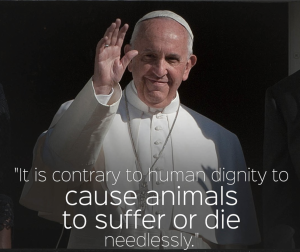 Pope Francis advocates greater compassion for animals—including not eating them. Biblical “DOMINION” over animals is not the same as our current DOMINATION of them, treating animals as objects cruelly exploited in factories for profit, which also does catastrophic harm to our shared planet.
Pope Francis advocates greater compassion for animals—including not eating them. Biblical “DOMINION” over animals is not the same as our current DOMINATION of them, treating animals as objects cruelly exploited in factories for profit, which also does catastrophic harm to our shared planet.
In his heartfelt encyclical, the Pope warns of the dangers of unbridled consumerism, lamenting humanity’s “reckless” behavior that has pushed the planet to a perilous risk via pollution and climate change.
READ MORE: http://www.animalsaustralia.org/features/pope-francis-appeals-for-kindness-to-animals.php
The biggest obstacle to change is simply our own personal and cultural inertia; breaking our lifelong and generations-old eating habits.
But change we must.
If we don’t, nature will force us to change more dramatically and painfully — with heat waves, droughts, floods and storms.
READ “Trees: Carbon Storage Experts” PAGE
READ MORE:
 1) Scientific American (introductory) article: “How Meat Contributes to Global Warming”: http://www.scientificamerican.com/article/the-greenhouse-hamburger
1) Scientific American (introductory) article: “How Meat Contributes to Global Warming”: http://www.scientificamerican.com/article/the-greenhouse-hamburger
![]() 2) Eating less meat would save millions of lives, billions of dollars — and reduce 29-70% of global greenhouse gases: https://www.washingtonpost.com/news/energy-environment/wp/2016/03/21/the-incredible-planetary-consequences-of-a-vegetarian-diet
2) Eating less meat would save millions of lives, billions of dollars — and reduce 29-70% of global greenhouse gases: https://www.washingtonpost.com/news/energy-environment/wp/2016/03/21/the-incredible-planetary-consequences-of-a-vegetarian-diet
3) United Nations Environment Program GEAS (Global Environmental Alert Service) PDF: http://www.unep.org/pdf/unep-geas_oct_2012.pdf
4) United Nations News Centre: http://www.un.org/apps/news/story.asp?newsID=20772#.VI-qCtZbxE0
5) Dec. 2014 Chatham House research paper: http://www.chathamhouse.org/sites/files/chathamhouse/field/field_document/20141203LivestockClimateChangeBaileyFroggattWellesley.pdf?dm_i=1TY5,30JL0,BHZILT,AUGSP,1
6) Worldwatch Institute report (w. link to full PDF document): http://www.worldwatch.org/node/6294
7) Cowspiracy’s website also has a FACTS PAGE with links to its sources: http://www.cowspiracy.com/facts
8) Food & Agriculture Organization (FAO) of The United Nations (2006) report, since revised a few % points: http://www.fao.org/docrep/010/a0701e/a0701e00.htm
 9) Eating meat causes cancer. A 2015 World Health Organization (WHO’s IARC) October 2015 study classified Processed Meat as “carcinogenic to humans,” and Red Meat as “probably carcinogenic.” READ THE PRESS RELEASE
9) Eating meat causes cancer. A 2015 World Health Organization (WHO’s IARC) October 2015 study classified Processed Meat as “carcinogenic to humans,” and Red Meat as “probably carcinogenic.” READ THE PRESS RELEASE
This world of information about the devastating environmental effects — and also the nationwide health effects — of our industrialized meat industry was a huge shock to me, and embarrassing because I’m a forest advocate and environmentalist who should (and could) have known it years ago. The information is, the facts are, astonishing and upsetting when the veil of societal secrecy (and willful avoidance) is pulled back. You can’t un-know it once you do; you can only push it away, bury it in your subconscious where it will quietly eat away at you. Like cancer.
“Transporation sector” — trains, planes, automobiles, etc. — emissions matter very much of course, as do emissions from filthy coal plants and fracking operations and nuclear power plant spent fuel — accidents aside. But only after five decades of eating animals and animal products daily did I fully grok the PETA (People for The Ethical Treatment of Animals) flyer I rollerskated over years ago, its headline, “Think you can be a meat-eating environmentalist? Think again.” Meaning: Eating animals — or NOT eating animals — is essential to cleaning up our collective environmental mess, more than what we drive and how our nation produces energy.
There is also GOOD NEWS in all this, friends. If you live beyond the reach of mass transit (as I do), can’t afford a Tesla or Nissan Leaf electric car, or even a Prius, and your dwelling doesn’t get enough sun to justify solar panels, you CAN do something with arguably even greater impact — watch what you eat. Learn that what you buy and literally consume, thus encouraging production of, matters immensely. Especially since we are social creatures and our behavior and thinking and choices affect others. Could you have imagined 25 years ago how much the culture of cigarette smoking would change in this country?
And you don’t have to give up eating all meat forever. Just begin your continuing education (it’s what I’m doing) and eat less of it, and the smaller the animal the better. I grew up eating meat 2-3 times daily, and was brainwashed, like everyone else in America, to think meat’s healthy and the best (really, only) way to get enough protein in my diet. Simply, truthfully, that’s a meat industry lie. One of many. In fact, for most Americans, or anyone eating a meat-laden American (and fast food) diet, if you don’t get enough exercise, eating less meat will likely improve your health.
Being an ex adman (copywriter), I’m especially rankled to learn we’ve all been fed a steady diet of misinformation. One of a dozen examples, and this from my childhood: a color poster in P.S. 116, my NYC grade school cafeteria, showing 3 tall, yummy glasses of milk. The poster explained cow’s milk is a great way for us young non-bovines to get Vitamin D and calcium. (There are lower fat, less processed plant foods that do this more efficiently and effectively.)
• over 800 gallons of water are used produce 1 gallon of cow’s milk (raising/watering the cow, processing, bottling)
• over 600 gallons of water to produce 1 (1/3-lb.) hamburger
• over 80% of Amazon rainforest destruction is to clear land for raising cattle, and growing GMO crops that feed them
This is a huge, behavior challenging topic; a big, brutal can of worms.
What to do about it? How to start? If like me, you enjoy digesting documentary films, try these, and in this order:
1) “Cowspiracy” – focuses on the environmental catastrophe that is modern meat and dairy production. Watch the trailer HERE: http://www.cowspiracy.com
2) “Forks Over Knives” – will show you that meat is NOT the only, nor the best, way to get your protein. On the contrary. Trailer: http://www.forksoverknives.com
3) “Food, Inc.” – great primer featuring Michael Pollan (author of “The Omnivore’s Dilemma” and “In Defense of Food”) on the unhealthiness of modern processed foods which have quietly crept into, and taken over, the American supermarket — and gourmet markets too. Trailer HERE.
You don’t have to take all this on at once, just get started. You’ll be glad you did, I promise. You’ll become part of the solution, our collective human solution to our collective human-caused problem. Especially if you have children, or if you love wild animals, or if you love domesticated animals, or if you love this planet’s ecosystem and its countless creatures. And even if you don’t, and you’re just focused on what will keep us humans alive, what other reasonable choice do we have?
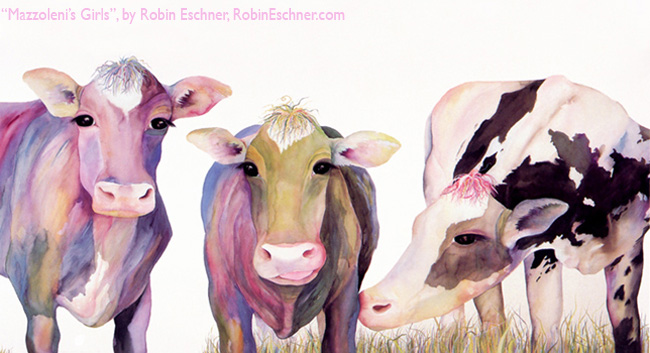
Mazzoleni’s Girls, 1986, by Robin Eschner, RobinEschner.com
SEE MORE artwork by the amazing Robin Eschner: http://www.RobinEschner.com/pages/paintings
We need another and a wiser and perhaps a more mystical concept of animals. Remote from universal nature and living by complicated artifice, man in civilization surveys the creature through the glass of his knowledge and sees thereby a feather magnified and the whole image in distortion. We patronize them for their incompleteness, for their tragic fate for having taken form so far below ourselves. And therein do we err, and greatly err. For the animal shall not be measured by man.
In a world older and more complete than ours, they move finished and complete, gifted with the extension of the senses we have lost or never attained, living by voices we shall never hear. They are not brethren, they are not underlings: they are other nations, caught with ourselves in the net of life and time, fellow prisoners of the splendour and travail of the earth.
– Henry Beston, The Outermost House: A Year of Life On The Great Beach of Cape Cod
VIDEO: The Secret Reason We Eat Meat by psychologist Dr. Melanie Joy (18 min. narrated). https://www.youtube.com/watch?v=ao2GL3NAWQU&t=15s
IF LINK IS BROKEN, go here: https://www.youtube.com/watch?v=ao2GL3NAWQU&t=15s
VIDEO: Matthieu Ricard, a Buddhist monk, author of, “A Plea for Animals” discusses the contradiction between our love for dogs and cats, and the brutal treatment of animals raised in factories as food. (2.5 min.)
• Longer (15 min.) VIDEO of Matthieu Ricard on this same topic: https://www.youtube.com/watch?v=oDEQY6svpfM
VIDEO: Think dairy is kinder, gentler and less environmentally destructive than carving up cows for burgers?
Think again.
Erin Janus VIDEO reveals the industry’s hidden ugly truths — in just 5 minutes:
Meat Industry:
Trump officials and meat industry blocked life-saving Covid controls, investigation finds
 The Guardian, May 12, 2022, by Nina Lakhani:
The Guardian, May 12, 2022, by Nina Lakhani:
EXCERPT:
The meatpacking industry, which includes slaughterhouses and processing plants – is one of the most profitable and dangerous in the US. It is a monopoly business, with just a handful of powerful multinationals dominating the supply chain which, even before Covid, was bad news for farmers, workers, consumers and animal welfare.
In late May 2020 – well after the importance of prevention measures such as testing, social distancing and personal protective equipment was widely recognized – an executive told an industry lobbyist that temperature screening was “all we should be doing”. The lobbyist agreed, replying: “Now to get rid of those pesky health departments!”
READ ARTICLE: https://www.theguardian.com/environment/2022/may/12/meatpacking-industry-trump-downplay-covid-threat?CMP=Share_iOSApp_Other
Animal Factories:
Dairy’s ‘dirty secret’: it’s still cheaper to kill male calves than to rear them
 The Guardian, March 26, 2018, by Tom Levitt: https://www.theguardian.com/environment/2018/mar/26/dairy-dirty-secret-its-still-cheaper-to-kill-male-calves-than-to-rear-them
The Guardian, March 26, 2018, by Tom Levitt: https://www.theguardian.com/environment/2018/mar/26/dairy-dirty-secret-its-still-cheaper-to-kill-male-calves-than-to-rear-them
EXCERPT:
Early disposal is known as the ‘dirty secret’ by farmers, and none relish it. But keeping the calf… to be raised for beef or veal means the farmer will have to rear them 2-4 weeks… at a typical cost of around £2/day, with selling prices at market as low as £25-40…
In contrast, shooting the calf costs as little as £9, including the cost [to] incinerate the body, or in some cases send them to kennels to be turned into dog food. Calves shot on farm cannot enter the human food chain and farmers can only dispose of calves themselves if they have a licensed incinerator.
VIDEO: 2 MIN. OVERVIEW OF A DAIRY FACTORY – This ain’t your grandfather’s dairy farm. And drinking modern cow’s milk is arguably MORE cruel to cows than eating hamburgers. (You can’t run a profitable dairy business, of ANY size, without taking a mother cow’s babies away, repeatedly impregnating her, wearing her out and only then ending her suffering by killing her.
Got dairy milk? Then you got indescribable cruelty. Instead, you can learn to love any of a dozen, healthier-than-dairy, plant-based milks. (I like oat milk on my cereal, almond or coconut milk in my milkshakes/smoothies, and soy milk in my coffee. Or try rice milk, hemp milk, macadamia nut milk, hazelnut milk, and so on).

